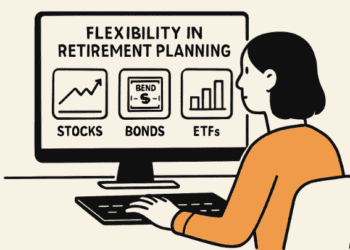Retirement image, Depositphotos
As retirement approaches, many seniors face a crucial decision: whether to continue owning their home or transition to renting.
Traditionally, homeownership has been synonymous with stability and financial security. However, renting in retirement has gained traction as a viable alternative for a variety of reasons.
In this article, we explore seven compelling reasons why renting a home in retirement may be the right choice for you.
-
Flexibility and Mobility
One of the primary benefits of renting in retirement is the flexibility it affords. Owning a home ties you down to a specific location, making it challenging to adapt to changing circumstances.
Renting allows retirees to maintain mobility, enabling them to explore new opportunities, travel, or relocate to be closer to family members. This flexibility can be especially valuable as healthcare needs evolve or when seeking a change of scenery in retirement.

-
Reduced Financial Responsibility
Homeownership comes with a host of financial responsibilities, including mortgage payments, property taxes, insurance, maintenance, and repairs.
In contrast, renting shifts many of these burdens onto the landlord, providing retirees with a more predictable monthly housing expense.
By eliminating the need for costly home repairs and renovations, renting can help retirees better manage their finances and enjoy a stress-free retirement lifestyle.
-
Access to Amenities and Services
Many rental communities offer a wide range of amenities and services tailored to the needs of retirees.
From fitness centers and swimming pools to organized social activities and transportation services, these communities provide a supportive environment that fosters an active and fulfilling retirement, especially if you consider moving into Belmont Village.
For retirees who cherish the companionship of animals, some properties even offer senior care that allows pets, ensuring beloved pets can remain a part of their lives.
Additionally, some rental properties offer maintenance-free living arrangements, allowing retirees to enjoy their golden years without the hassle of household chores.
For those who value accessibility, especially in multi-level homes or communities, features like Cube Lifts home elevators can make daily movement easier and safer—an important consideration for aging in place or reducing fall risk.
-
Liquidating Home Equity
For retirees looking to unlock the equity tied up in their homes, selling your house at the best time and downsizing to a rental property can be an attractive option.
Liquidating home equity provides retirees with a lump sum of cash that can be used to supplement retirement income, cover healthcare expenses, or fund leisure activities. For some, this might also include considering a reverse mortgage—though it’s important to carefully weigh the pros and cons of reverse mortgage before making such a decision.
Renting allows retirees to access the value of their home without the hassle of maintaining homeownership.
Also read: Gen Z to Spend $18,000 More on Rent by 30 than Millennials – Study Reveals
-
Mitigating Market Risks
The housing market can be volatile, with property values fluctuating based on economic conditions and demographic trends.
By renting instead of owning, retirees can mitigate the risks associated with market fluctuations and avoid being tied to the ups and downs of real estate prices.
Renting provides retirees with stability and peace of mind, knowing that they are not exposed to the inherent risks of homeownership.
-
Simplifying Estate Planning
Renting simplifies estate planning by eliminating the need to transfer ownership of real estate assets to heirs.
Unlike homeownership, which requires careful estate planning to ensure a smooth transition of property ownership, renting allows retirees to pass on financial assets without the complexities of managing real estate.
This can streamline the estate settlement process and minimize potential conflicts among beneficiaries.
-
Eliminating Homeownership Hassles
Owning a home entails a myriad of responsibilities, from lawn care and home repairs to property taxes and insurance premiums.
Renting frees retirees from these hassles, allowing them to enjoy a maintenance-free lifestyle without the stress and strain of homeownership.
By outsourcing property management tasks to a landlord, retirees can focus on pursuing their passions and enjoying the fruits of their labor in retirement.
In conclusion, renting a home in retirement offers numerous advantages that make it an appealing housing option for seniors. From increased flexibility and reduced financial responsibility to access to amenities and simplified estate planning, renting provides retirees with a convenient and carefree living arrangement. Whether you’re seeking to downsize, unlock home equity, or simplify your lifestyle, renting may be the perfect solution for your retirement housing needs.
Exclusive Summary:
Here is the exclusive summary of 7 reasons you should rent a home in retirement:
- Renting a home in retirement offers flexibility and mobility, allowing retirees to explore new opportunities and locations.
- It reduces financial responsibility by shifting burdens such as maintenance and repairs to the landlord.
- Access to amenities and services in rental communities enhances retirees’ quality of life and fosters an active lifestyle.
- Liquidating home equity through renting can provide retirees with additional funds for retirement expenses.
- Renting mitigates market risks associated with homeownership, providing stability and peace of mind.
- Simplified estate planning is a benefit of renting, eliminating the complexities of transferring real estate assets to heirs.
- Renting eliminates the hassles of homeownership, allowing retirees to enjoy a maintenance-free lifestyle and focus on their passions in retirement.
Related Stories to 7 reasons you should rent a home in retirement:
The Rise of Retirement: Exploring America’s ‘Great Retirement’ Wave
Top 10 Retirement Destinations in the U.S
Three Reasons the World’s Billionaires Buy Gold in Good Markets and Bad

















